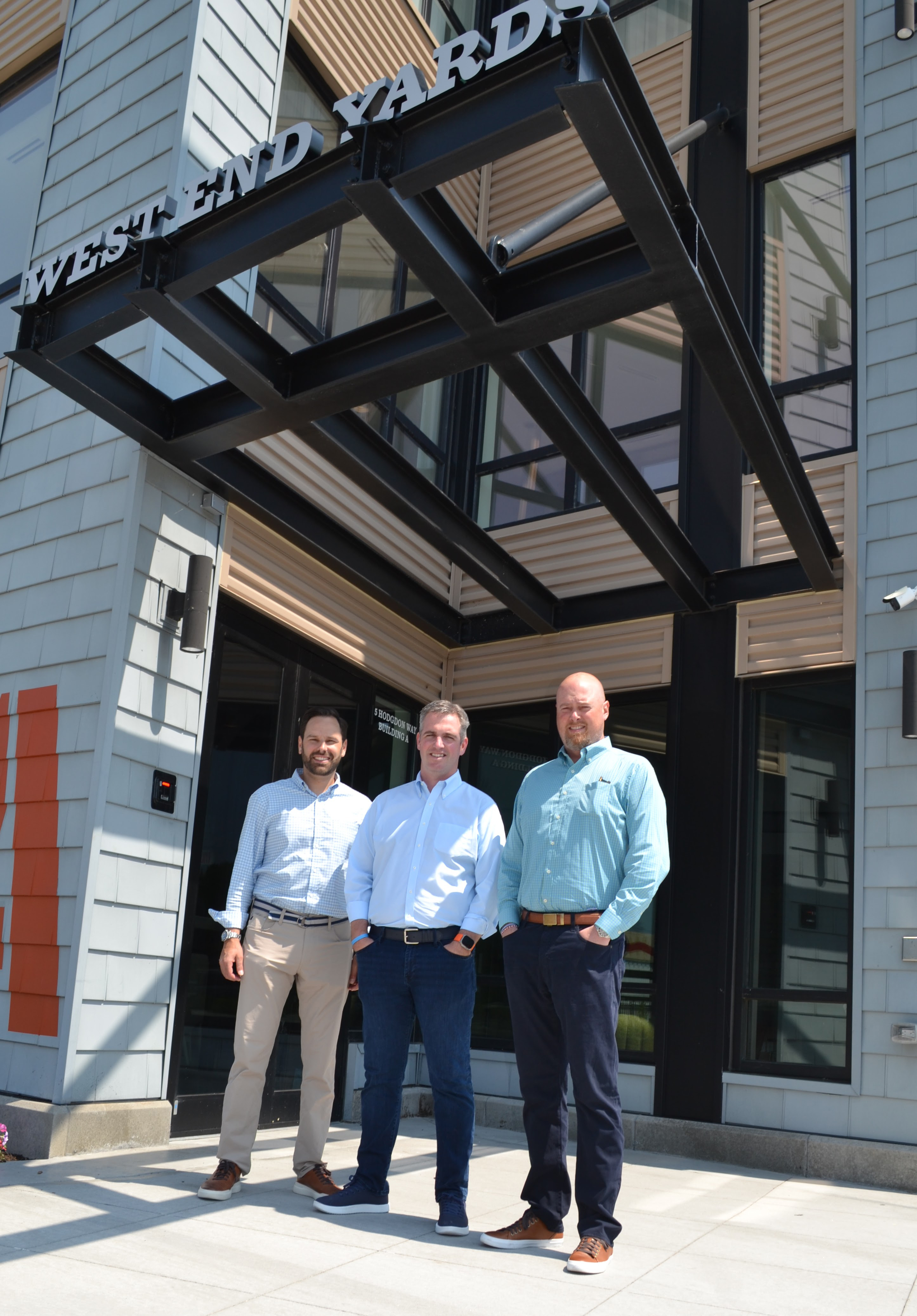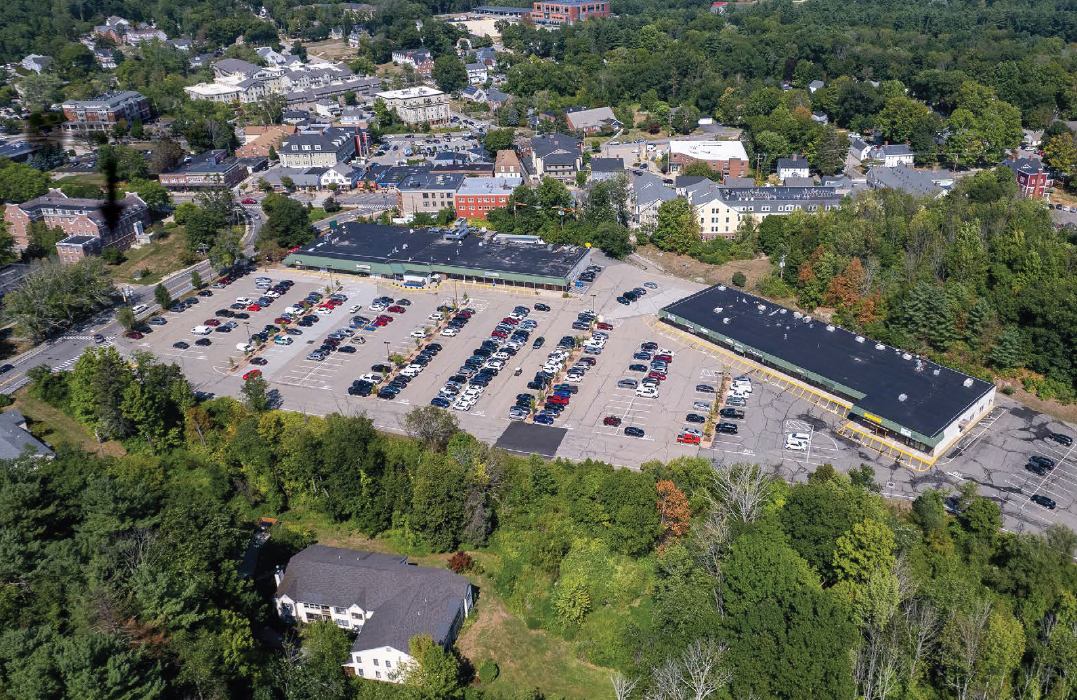Torrington Properties has invested over $500m in NH

Torrington Properties, which has invested upwards of $500 million in New Hampshire properties so far, has added the Mill Plaza in Durham to its portfolio. Pictured here, at West End Yards in Portsmouth, another of Torrington’s projects, is, from left, CEO Jay Bisognano, COO Matt Morgan and Brett Pagani, head of capital markets. (Photo by Paul Briand)Torrington Properties, which last month purchased Mill Plaza in Durham for $8.8 million, has been growing its portfolio of commercial, retail and industrial properties across New Hampshire steadily since entering the New Hampshire market seven years ago.
By the company’s estimate, it has invested over $500 million so far in the Granite State, starting with the Veridian Residences, an apartment complex in Portsmouth, in 2016.
The latest purchase, the Mill Plaza, is a shopping area anchored by a Hannaford grocery store and Rite Aid pharmacy in the heart of downtown Durham purchased from Colonial Durham Associates, which was unsuccessful in a recent effort to redevelop the site for residential and commercial use.
Torrington said it has no immediate plans for the 10-acre plaza other than to start filling its empty storefronts. Besides Hannaford and Rite Aid, it is the current home to Allegiant Physical Therapy, Appledore Family Medicine and Pediatrics, Domino’s Pizza, Mei Wei and The Works Café.
“Mill Road Plaza is a welcome addition to our growing retail and commercial portfolio,” Torrington’s chief operating officer Matt Morgan said. “This is an important piece of our investment strategy in grocery-anchored shopping centers.”
Torrington is based in Boston, but its executive team has been spending a lot of time in New Hampshire since its initial Veridian Residences venture.
“By virtue of that, we started to notice other opportunities, and we really liked a lot of the different dynamics around the different municipalities that are here. So we’ve grown into an owner of retail, office, industrial and mixed use,” said Torrington CEO Jay Bisognano.
“In spending countless hours permitting, which is hard, we noticed that, by and large, most municipalities wanted to be constructive and wanted to solve problems and wanted things to be transformed. And, frankly, that’s never been our experience elsewhere,” added Bisognano. “So, we’re hooked to the point where we’ve built a business portfolio that’s heavily weighted towards the state.”
West End Yards
Here, in no particular order, are the investments in the Granite State, bookmarked by the earliest (Veridian Residences) and the latest (Mill Plaza): Fort Eddy Shopping Center, Concord; Newington Park Shopping Center, Newington; Sears, Newington; commercial offices on Domain Drive in Exeter; West End Yards, Portsmouth; a housing development at the site of the former Cinemagic in Portsmouth; Campus Flats, Durham; industrial space in Seabrook; and Wellington Hill development site, Manchester.
Its purchase of 100 Domain Drive in Exeter for $46.9 million is considered one of the largest commercial office real estate acquisitions in recent years.
The 263,000-square-foot building’s tenant roster includes Bauer Hockey, FH Cann & Associates and Garnet Hill.
The Torrington team assesses a potential project, not only for its return on investment but for its potential transformation.
“Generating a return is important for a lot of people — It’s important to us — but it’s nowhere near the most important part of what we do,” said Bisognano. “We thoroughly enjoy transforming. Yes, it has to make economic sense and, yes, the dynamics have to line up. But when we apply our vision to any given property, we feel that if we can execute on that vision, we’re mitigating our risk.”
An interview with the Torrington team — CEO Bisognano, COO Morgan and Head of Capital Markets Brett Pagani — took place at West End Yards in Portsmouth.
The West End Yards project itself is big in its vision and scale. Spread over 10 acres at the corner of U.S. 1 Bypass and Hodgdon Way, it has two apartment buildings containing 252 units. Apartment buildings in the first-floor common areas have a cafe, work space, even a dog spa. There are two commercial buildings: the new home for the Buffalo Wild Wings restaurant that relocated from the Fox Run Mall in Newington. It is also the new corporate home for ConvenientMD.
As with the recent acquisition of the Fort Eddy Shopping Center in Concord, Torrington said it is focused on acquiring grocery-store-anchored, community-focused retail plazas and investing in them to improve the shopping experience.
“Vision and expense and setting that bar super high — it’s a pillar of what we do,” said Bisognano. “We are not merchant builders. We are here to build something like this and own it. And how do you do that successfully? I think you’ve got to build it right and you have to go the extra mile, because it retains tenants. It makes people feel more at home. It just creates a long-term sustainable investment when you do it all the way through.”
Asked about their vision for the now vacant former Sears department store in Newington, Bisognano described it as “a unique challenge.” Torrington acquired the store in October 2022 for $11.5 million.
“We’re in the middle of reimagining that box,” he said. “We’re in the first inning of that. But it presents some risks, but also, in our opinion, significant opportunity to hopefully add some life to something that is vacant and producing just about zero. But that does go back to the vision of trying to think outside of the box and trying to add the creativity that is a big piece of our strategy, our business.”
‘Respect level’
In acknowledging an overall “business-friendly” attitude in the state, the Torrington executives say success comes about with the approach that projects are partnerships, they are relationships between the developer and the community built on respect.
“There’s a respect level on both sides of the table, and it’s very refreshing,” said Morgan. “Both sides doing a lot of listening and understanding before responding which is a thoughtful approach that, as developers, is really appreciated. While we might not always agree, to be able to have that conversation, and be productive and constructive, that’s hard to find, and we found it in multiple places in the state.”
Added Bisognano: “It becomes a partnership. The building we’re sitting in is a partnership with the city of Portsmouth. You don’t get to come in and dictate everything. There has to be community benefit, and there has to be give and take. We’ve experienced that with this city and others. We’re partners; we have to be.”
It’s a value they’ll apply to whatever might come from their purchase of the Mill Plaza in Durham. Morgan cited their experience with Campus Flats, a housing project serving the needs of University of New Hampshire students.
“Durham’s a unique place,” said Morgan. “It has the town, it has the university, has the residents, has the students, it has the business community. And we’ve built relationships with the town as well as the university, and it’s been very, very productive.”
The Torrington team is keenly aware of the need for housing in New Hampshire, particularly the need for affordable housing.
When it comes to rental housing, for Bisognano, there has to be enough of a balance between units rented at market rates and workforce/affordable units rented at less expensive rates.
The state’s current law says communities must provide “reasonable and realistic opportunities for the development of workforce housing” as long as the areas meet “reasonable standards” that include water and sewer infrastructure.

Mill Plaza in downtown Durham has been purchased by Torrington Properties for $8.8 million, another in Torrington’s torrid pace of acquisitions in New Hampshire totaling upwards of $500 million so far. (Courtesy photo)
“There is a requirement for workforce housing,” said Bisognano, “and that is a good first step at trying to provide some affordability. So we’ve certainly complied with that and we’ll continue to do it and we’re proud of it.”
The question for developers, and policymakers, is how much of a project should be made affordable: 5 percent, 10 percent, 20 percent, more?
“Where that becomes challenging is when the percentage of workforce housing becomes — call it 20 percent — it becomes prohibitive,” said Bisognano. “That’s when development stops. And so you don’t get 20 percent workforce housing, you actually get zero because the project doesn’t occur.”
Part of the solution, according to Bisognano, is coming up with creative solutions to make that 20 percent affordable to the developer, through zoning relief, short-term property tax credits or creative financing, to name a few.
“If we can apply some of our energy to creative thinking, we’ll figure it out,” he said. “We’re actively looking at opportunities to create 100 percent affordable housing in some cases in some municipalities. We are, again, in the early stage, but you’ve hit on something we’re actively working on.”
Bisognano had extensive experience with a property management company in Boston before starting Torrington Properties in 2015 as founder and principal.
Morgan, with a background as a commercial real estate broker, joined Torrington in 2016, and Pagani joined in 2017, having worked in commercial mortgage brokerage.
Bisognano, when he speaks of partnerships, also includes all the collaborators within Torrington, which has 35 employees.
“This is not done with just the three of us,” he said. “This is done in collaboration with a lot of folks — everything from great investors to great builders to great attorneys. It is a family of people, which we’re proud of.”